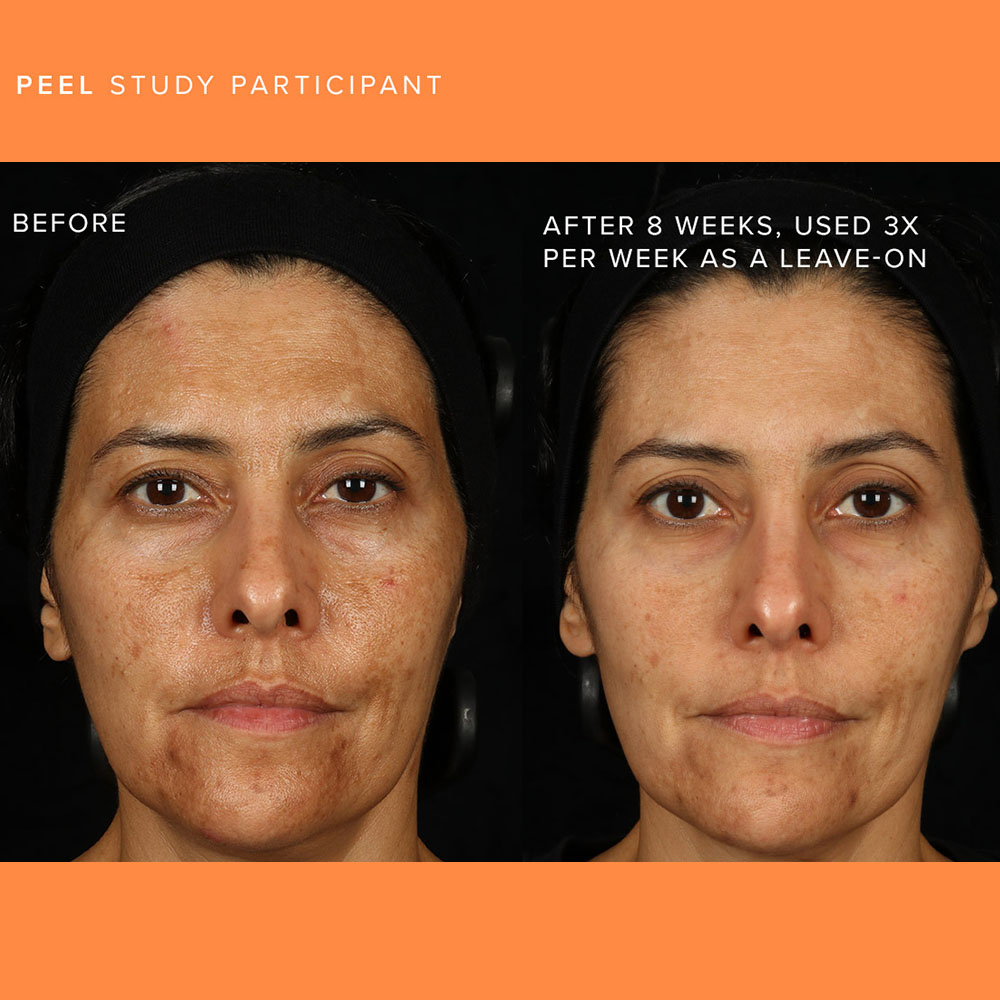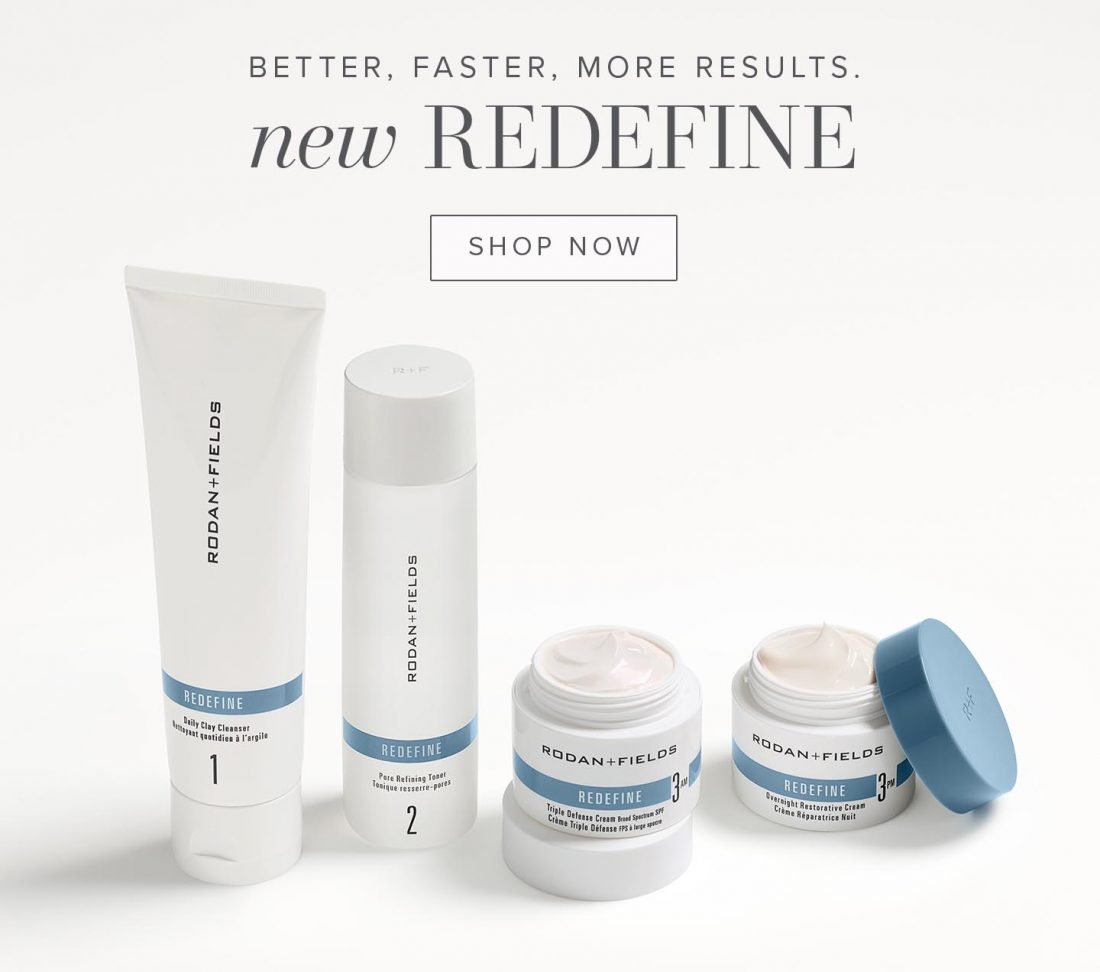Experiencing discoloration after an acne breakout can be unwelcome and frustrating when you want your skin to look its best. At Rodan + Fields, we want to help you achieve visibly brighter skin with specialized products that fight blemishes and discoloration. Read on to learn more about how acne can affect the appearance of your skin and what you can do to keep it looking clear and vibrant.
How is acne related to discoloration?
There are several ways that acne blemishes can lead to discolored spots on your skin. As your lesions heal, the surrounding blood vessels may dilate and create reddish or purplish areas on your skin. Acne can also cause inflammation and damage your skin cells, which may respond by releasing more melanin, a pigment that darkens the skin.
The deeper the inflammation or injury, the more likely it is that discoloration will occur. Any activity that damages your skin, like picking, popping, or squeezing pimples, increases the chance of discoloration. You may also be at greater risk if you spend time in the sun without UV protection or if you have a darker skin tone that produces more pigment when it is affected by acne.
The main differences between acne scars and discoloration
Although both acne scars and discoloration can make your complexion look uneven, they are different skin conditions that require different treatments. Acne scars manifest as depressed, pitted, or raised skin tissue that is sometimes characterized as “boxcar,” “icepick,” or “rolling” scars.
Discoloration from acne shows up as dark spots on otherwise normal-looking skin. Picking or popping pimples can cause both scarring and discoloration because your lesions are more likely to become inflamed and infected after this interference, resulting in deep damage that takes longer to fully heal.
What causes acne blemishes and discoloration on the skin?
Acne occurs when your skin’s hair follicles become congested with oil, debris, and bacteria and subsequently cause inflamed comedones, pimples, or other lesions to appear.
When the sebaceous glands that lubricate your hair follicles produce excess oil that mixes with debris and bacteria in your pores, your skin can become congested and infected, forming pimples, papules, and other kinds of acne lesions.
If your skin produces too much melanin as the blemish heals, the damaged area of the skin may become discolored even if the lesion was minor. The greater the degree of inflammation, the larger, darker, or more stubborn the spot will be.
How to get rid of acne scars and discoloration: Best treatments
To correct skin discoloration that is caused by acne, adopt a skincare regimen that will prevent new breakouts. Regularly treat and exfoliate your skin with products that will encourage your body to replace damaged skin cells with new, healthy cells. Treatments to make your skin look more even include:
Targeted skincare treatments
When you include targeted acne-fighting, brightening, and exfoliating treatments in your skincare regimen, you can reduce breakouts and improve your skin tone and texture to minimize the appearance of acne-related discoloration.
Applying topical retinols and retinoids
Retinols and retinoids help encourage cell regeneration at the surface of your skin, which can help your skin shed discolored, damaged cells and replace them with new, healthy skin cells. If you elect to use retinols or retinoids, be sure to use SPF and wear sun protection whenever you head outdoors.
Chemical peels
Chemical peels use a highly concentrated glycolic or salicylic treatment to remove and resurface the outer layers of your skin. This deep exfoliation can reduce the discoloration associated with acne as your skin sheds damaged cells and replaces them with healthy ones.
Dermabrasion
Dermabrasion involves using a special tool to remove the top layers of your skin with an abrasive action that is similar to sanding. As the tool removes damaged skin cells, it may reduce the appearance of acne-related discoloration.
Laser Therapy
Laser therapy is an in-office procedure that uses a high-energy beam of light to remove and resurface the outer layers of your skin. This treatment can reduce post-acne discoloration by causing the skin to replace damaged cells with healthy cells.
Microneedling
Microneedling is a treatment that uses a special tool that creates several tiny punctures in your skin. As these heal, they encourage old, damaged, and discolored skin cells to shed as a new layer of skin takes its place. These new skin cells may be more even-toned, reducing the appearance of dark spots.
How long does it take for acne treatments to work?
Acne treatments may take four to six weeks to work. It may take three to six months for your skin to visibly clear.
Expert tips for preventing acne and discoloration
When it comes to preventing acne breakouts, there are many steps you can take to ward off unwelcome blemishes. Some steps include:
Wash your face correctly
Twice a day, wash your face with an acne-fighting cleanser that is suited to your skin type. This practice will remove dirt, oil, dead skin cells, and bacteria that can interact to cause breakouts. Take care to avoid harsh cleansing agents, scrubs, or abrasive washcloths that could irritate your skin.
Consider your hair care routine
If your hairstyle causes your tresses to brush against your skin, make sure that the conditioning, treatment, and styling products you are using are non-comedogenic, non-allergenic, and do not otherwise irritate your skin.
Refrain from touching your face
Touching your face is an easy way to spread acne-causing bacteria over your skin, which increases your chance of developing new acne blemishes.
Use cosmetics sparingly
If you wear foundation or other makeup, make sure that it’s labeled as non-comedogenic. Wear as little makeup as possible, as infrequently as possible, and remove it at the end of each day with a cleanser that will completely lift it off your skin and allow it to be rinsed away.
Avoid the sun
Sun and UV exposure can cause your skin to overproduce oil and lead to an increase in redness, inflammation, and melanin production. This can trigger acne breakouts and related discoloration.
Reduce stress
Reducing stress in your life can potentially lower the inflammation in your body that can contribute to acne breakouts.
Maintain a regular skincare routine
A good skincare regimen that includes products that contain acne-fighting ingredients can help you reduce or eliminate breakouts. Engaging in a regular skincare routine that is targeted to keep your skin healthy will help you keep your skin in good condition.
These tips can help you ward off acne-related skin discoloration:
- Keep your acne under control and do everything you can to prevent new breakouts.
- Apply a non-comedogenic SPF every day and limit sun exposure.
- Avoid products, fabrics, and situations that will irritate your skin.
- Keep your skin clean and hydrated.
- Use gentle exfoliating and skin-brightening products that will encourage cell turnover and renewal.
When to see a dermatologist for acne and discoloration
When you have an acne breakout, be sure to treat it quickly to reduce the amount of inflammation you’ll experience. If managing your acne with skincare and lifestyle adjustments is not giving you the results you want, consider seeing a doctor who can suggest new modes of treatment. A dermatologist may be able to help you when:
Your acne is resistant
If you feel like you have done everything you can to treat your acne, but you still suffer from breakouts and inflammation, you may need prescription medication to treat your condition.
Your breakouts leave discolored marks on your skin
If your acne blemishes cause discoloration or dark spots, a dermatologist can help mitigate them and help you prevent new breakouts and damage.
Shop top-quality products to treat acne and discoloration at Rodan + Fields
One of the best ways to manage your acne, improve your skin, and prevent dark spots is to maintain a regular skincare regimen that utilizes skin-loving, blemish-fighting ingredients that will help keep your skin looking clear and bright. Our R+F PAIRED Regimen for Acne + Discoloration is a powerful four-step solution that helps prevent new breakouts while working to create the appearance of a more even skin tone.
The regimen includes the UNBLEMISH Refining Acne Wash, UNBLEMISH Dual Intensive Acne Treatment, R+F Multi-Acid Enzyme Peel, and UNBLEMISH Invisible Matte Defense Broad Spectrum SPF 30 sunscreen, which work synergistically to minimize and prevent acne and renew and protect your skin. Proprietary technology and key ingredients like salicylic acid, benzoyl peroxide, ceramides, and Rodan + Fields ProAcid Enzyme Complex work together to keep your skin looking clean, clear, and healthy.
If you’re looking to achieve visibly brighter, clearer, and more even-toned skin, Rodan + Fields is here to help. Our selection of acne washes and treatments can improve the look of your complexion and boost your confidence in your appearance.





